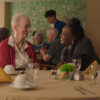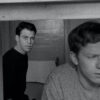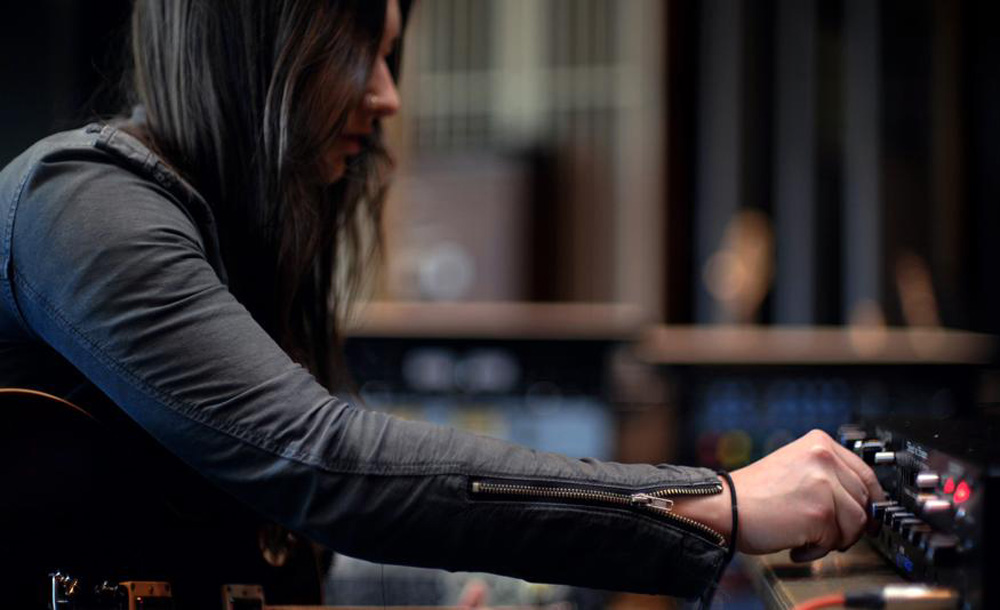Alison Tavel didn’t know what exactly she was opening when she started digging into her grandmother’s attic in Indianapolis, unearthing the creation of her late father Don, who passed away when she was just 10 weeks old. The Resynator never made it to market, but it was set to become a revolutionary piece of technology for the music industry as a precursor to Musical Instrument Digital Interface (MIDI) that is used today, a synthesizer that could react to live music. Only a prototype was made, but Peter Gabriel had ordered three and others were intrigued as Don Tavel started making the rounds to get musicians excited about the possibilities of his invention, yet it was reduced to collecting dust when he died in a car accident, leaving Alison only with the stories of what a brilliant man he was as she was raised by her mother and curiously got into the music world herself, not as an artist but an assistant for the singer/songwriter Grace Potter.
“Resynator” would be fascinating if only Tavel followed her father’s creation of the potentially groundbreaking synth, testing it out now with modern musicians who are captivated by its quirks and discover new sounds in their experimentation. However, Tavel is admirably after something deeper and beyond hearing sounds being bent in new ways, there are many twists as the director starts to learn more about her father, who all agree was a genius, albeit a tortured one as relatives no longer feel they have to hide his darker side from her. It can be remarkably poignant to see Tavel at the same music convention where her father introduced the Resynator 30 years earlier, but even more so as she learns of him in all his dimension, being able to see at least physically the man he would’ve looked like today when he left behind an identical twin brother she meets for the first time and really come to understand who he was as she criss-crosses the country and meets personal and professional acquaintances who remember the good and the bad.
After a decade in the making and all the richer for it, “Resynator” will be making its world premiere this weekend at SXSW and on the eve of its debut, Tavel spoke about what led her to take a camera along with her as she embarked on the wild trek into her family history, becoming an amateur engineer during the pandemic and using the latest tech to duet with her dad.
You explain in the film about how you embarked on this to begin, but how did you know you wanted to take a camera with you?
I’m a first-time filmmaker and I was 25 years old and I never intended for it to end up like this, but I’m so glad that it did. Originally, there was this innocent curiosity of what is this synthesizer? I was on tour with the musician Grace Potter for a couple of years, and throughout the touring, I would meet musicians and bands who we were on tour with or at festivals, being around all of this gear. People would talk about synthesizers specifically. Sometimes it would come up in conversation [where] I’d be like, “Oh, my dad invented something like that. I think it’s called the Resynator.” And then I’d be [asked], “Well, what kind of synth is it?” And I’d say, “I don’t know.”
How it all started was just wanting to know what the synth was and I thought, “Oh, this will give me something cool to talk about with my tour buddies. I’m not a musician, so this will be something that connects me to these people who I respect and love. What a cool thing to say that my dad invented a synth.” But I didn’t know that it was great. I knew it was called the Resynator and I’d Googled it in the past, but nothing would really come up. Then I had this concert where I was talking to this musician, and I told him [the story] and it led me to Google “Don Tavel Resynator,” This new article came up from three months prior, a review of an old ad that had been released and I thought, “Well, maybe there’s still something interesting about this. People are still talking about it.”
So when we had a couple of weeks off tour, I decided to go get the Resynator from the attic, just trying to figure out what it was, and when I got it out of the attic, I found out who my dad’s engineer was and got in touch with him, [thinking], “Well, he can help me resurrect it,” and I thought I should bring a friend with a camera to record it because my intention at the time was cut something together for my buddies that I can show, like, “This is the process of resurrecting a synth. Then it turned into something so much more than that and I thought, “Well, maybe I should get a sound guy,” and I couldn’t afford a sound guy, but I could buy a Zoom audio recorder and use that. It was really scrappy for a while and then it became a little bit more professional and I learned how to make a film along the way. If you watch the film, you can see the progression there, and there are some scenes that are a little janky, but that’s the art of true journalism and storytelling — it’s not always pretty, but it’s real.
In order to make a film like this, it doesn’t seem like a decision you’re making for yourself, but your entire family when it involves your collective past and it’s quite sensitive. Was it difficult on that front?
It definitely was. I know that there’s sensitive subject matter in this film. My main goal was to tell my story from my perspective, and I knew that was going to be hurtful to some people because there’s really hard things that are said about my dad in the film, and about my grandmother, but I was really relieved that even though it was hard for some of my family members to hear these things, they were supportive of it. That’s one of the big themes — unconditional love — and you don’t have to understand it, you just have to support it because the person you love says so.
My mom specifically has been nothing but supportive and she has been my whole life. That’s a big reason why I was never yearning to learn about my father because my mom, for the first nine years of my life, was my mom and my dad. She played both roles so well. And I have an older sister Ali who was so supportive and I’m really close with her. Then my stepdad came into my life when I was nine and he moved in when I was a freshman in high school, so he was my dad and I had a full family. I didn’t need my biological father and I didn’t know him. And when this whole project came about, my mom had been holding some stuff in, like that letter that she reads, that she never told me about before, so I think that this film is actually, for her specifically, a bit of closure because finally people get to see what happened to her because it was really hard. She is an unbelievable woman and just did such a great job raising us, never projecting those negative things on us. But as an adult when I came to her asking for the truth, she gave it to me and that’s the main takeaway with my mom versus other people.
Somebody dies and they become this angelic person, and I understand why you may not want to share all of that darkness to a three-year-old. There’s no reason to do that. My mom knew that my dad was kind and generous, and that’s what Ali needed to know [at the time]. But then as an adult, she [told me], “Well, here’s what happened. Here’s this letter and you want to know.” We have this very open, honest relationship, and for some people, it was closure. For some people, it was hard. My cousins all watched it and that was maybe one of the most rewarding things because they said that they felt like they got to know my their uncle. But regardless, everybody in my family who’s watched it feels this whole part of them was unlocked, and that’s how I feel when I watch the film — this represents a decade of my life, and it’s such an important part of me that I never had access to before I started.
You start filming well before the pandemic and the film is so well-organized, I wondered if that period could give you a chance to take stock of what you had already as far as interviews?
This is interesting because the only thing that I filmed during the pandemic was my interview with Jon Anderson and that’s why it’s on Zoom — he’s in the demo montage. But I started filming in 2014, and I’d done pretty much all of the demos but Money Mark pre-pandemic, from 2016 through 2019. That was me learning about the Resynator, letting the musicians guide me. Then in the pandemic, I didn’t have the luxury of musicians coming over and turning knobs, so I had to figure out how to keep it going and keep learning, even though we were all stuck at home. My partner is a drummer and a producer, so he learned how to engineer and he really used the Resynator well. I decided that I would do something along the lines of what Wendy Carlos did back in the day for her “Switched On Bach” records, [which] put the Moog synthesizer into the realm of, “Oh, this is the real instrument because here we’re hearing Bach music but played by this thing that we don’t recognize. Now we can understand what it does because of this composition that we all know and love.”
I [thought], “Well, maybe I’ll cover some well-known songs using just the Resynator so that people can understand what it sounds like,” and in doing that, Matt and I basically just made all the sounds and then got singers to sing on them. I did a Kraftwerk cover because Florian [Schenider] had passed away, so I [thought], that would be a good tribute to do “Computer Love” and I got Lucius to sing the vocals. Then Tom Petty’s “Wildflowers” was being re-released with 10 additional songs, and I’m the Tom Petty estate archivist, so I was like, “This is a cool project to tie my two worlds together” because on the “Wildflowers” record, there were no synths. So I thought what if we did a cover of a Tom Petty song on Wildflowers that’s only synths and specifically only Resynator.
I got Grace Potter to sing on “Honey Bee,” Matt Berninger from The National and Ronboy to do a duet for “Only a Broken Heart,” and then Ruby Amanfu for “Somewhere Under Heaven,” these three Tom Petty covers that were all Resynator and then vocals, [so it could answer the question], “Well, what does the resonator sound like? It can sound like anything. With a little sound design and compression and delay and reverb, you can make it sparkle.” So by doing those covers in the pandemic and taking advantage of the fact that nobody could do it but me and my partner Matt, I got to learn so much more about the Resynator that I probably would never have because we were all at home. I also started trying to learn how to solder, and I’m still trying to learn how to solder, but those things were actually really beneficial for me. I got to take it apart.
I was really moved to see in the closing credits that you’re credited with co-writing some of the songs with Don. How did that come about?
That was one of the last pieces to put together because I wanted an original end credit song, and I found this record of this album my dad had made of just one vinyl copy. There’s this song called “Just For You,” and it’s what you hear at the end of the film. He plays 40 seconds of a song and then he switches the tempo and the key and it goes into an entirely different song. It’s basically two songs and the first part is very short and just him and an acoustic guitar, so [I thought] what if we expanded on that song for the credit reel? We took the first 40 seconds, but then I created a chorus and a B section and [thought] we could build it out with a full band of musicians who he loved to play on it, so it could be this tribute song for my dad and I could co-write it.
We just had this demo and Matt played all the different parts and he [sang] the male part and then I decided to sing, so it would be like a duet and I [thought] about getting a musician who maybe my dad would have loved to sing the male part, but when the number one musician I reached out to sing vocals couldn’t do it, I was really upset and I called Grace, who has known me throughout this whole process and [was] a sounding board for me, [and told her], “Ugh, what am I going to do? I can’t find a vocalist. This film’s wrapping. I need to figure this out.” And she was like, “Get Don to do it.” I was like, “But he didn’t sing those parts and I wrote the lyrics for everything else,” and she’s like, “Get AI to do it.” I was really on the fence about it because I understand the technology, but I don’t use it, I don’t like it, and I am scared of it. But this is exactly what, if my dad were alive, he would have been reaching for. He probably would be at the forefront of it, so I thought about it and it made sense, like “I’ll do a duet with my robot dad. Let’s give it a try.” [laughs]
So we got this software and my friend Deren is more technical than we are, so we sent him the dry vocal stems of my dad and Deren sent us back these AI versions. We thought we could attach it to Matt’s vocal, but it wasn’t tracking Matt’s vocal that well, and so even though I’m a female, we just decided I should try it and it tracked my vocal really well, maybe because I’m his daughter and the AI thinks our genetic DNA is easier to attach to [which] I thought was really interesting. But I kept having to make sure I [wasn’t saying], “Can you make my dad do this?” Because I don’t want to go down a deep dark hole of talking to my dad when I’m sad. But what’s in the film is this AI-generated version of my dad’s vocal and it’s still a demo, Matt’s still playing all the parts, and over the course of this film festival circuit that I’m about to go on, what you’ll hear is this timestamp of the technology as it was in late 2023/early 2024 and by the time this film gets released publicly, my hope is that we can go back in, update the song with better technology and get those musicians who I really want to play on the song. But for now, I love the song. I almost don’t want to tell people that it’s AI because whenever I show anybody who doesn’t know, they’re like, “What band is this?” And I’m like, “It’s not a band. “It’s not even a person.”
I am not a fan of AI either, but I think you found the loveliest use for it possible. If you’ve been living with this movie since 2014, what’s this moment like for you?
I’ve almost felt the closure. I’ve seen the light at the end of the tunnel and I felt like watching the film in its entirety for the first time was such a rewarding experience. On the business side of things, this has been the hardest thing I’ve ever had to do and I’m so lucky to be able to say that, but I’ve poured my whole life [into it] and it’s my identity [now]. So there’s this coming to terms of like, “I’m an archivist, I have a career outside of filmmaking as well, but I’m so used to talking about ‘Resynator’ and making ‘Resynator,’ what am I going to do [next]? I’m also like, really nervous about the next thing because I don’t want there to be a next thing. I always want to be working on this project and I always want to talk about how stressful it is and how busy I am, so I don’t know how to describe it. I’m so happy that it’s finally coming out, but I also just feel so weird about it.
“Resynator” will screen at SXSW on March 10th at 6 pm at the Alamo Lamar 4, March 13th at 6 pm at the Rollins Theatre and March 16th at noon at the AFS Cinema.




